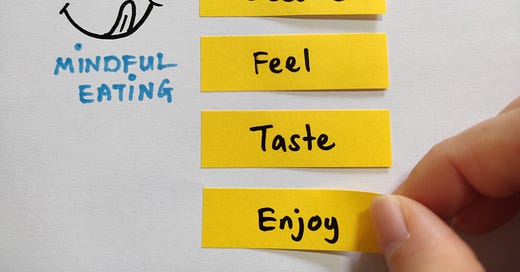Did you know, the human brain controls digestion through the nervous system? Many of us have experienced how a mindful approach to life - the idea of being fully present in the moment without judging it - amplifies feelings of joy, acceptance, energy, peace and wellbeing. Mindfulness also has benefits when you apply it to nutrition. Calm and intentional eating helps us digest food better, which helps with absorption of vitamins and minerals and aids in overall gut health.
Scientists have learned that mindfulness facilitates the switch from being in “fight or flight” mode, in which the sympathetic nervous system is dominant, to a “rest and digest” mode, in which the parasympathetic nervous system dominates. When we’re chronically stressed, on-the-go and don’t take the time to be present when we eat, every stage of digestion shuts off. Saliva production decreases, stomach acid declines, liver and gallbladder function become impaired, important enzymes and digestive secretions are lowered. The result? A heavy and sluggish feeling after meals, heartburn, gas, bloating, cramping, irregular bowel movements, and even food sensitivities.
Being mindful at mealtimes can help you chew your food more, become aware of when you’re full, and identify moments when you might be eating because of stress, habit, or emotions.
This past week, we gathered some practical suggestions for ways to tune into our minds and bodies before, during, and after food intake:
Cook at home, from scratch: Buy quality ingredients and make food that you enjoy.
Create a calm environment for eating: Light a candle or play some music, and set the table using plates and utensils that you like.
Try a gratitude practice around meals: From seed and soil to animal, farmer, and your own hands that prepared this food, there are infinite ways to appreciate all the steps involved.
Limit distractions when eating: Turn off your phone, computer, and TV.
Eat with friends and family.
Breathing exercise: Take 10 deep belly breaths before meals and do a body scan, head to toes, to help release tension.
Eat slowly: Use all your senses to experience the food you’re about to eat. Smell, taste, and chew each bite.
Check in with hunger cues as you go: Notice when you feel full, if your meal is missing something, or if you feel satisfied and re-energized.
By following some or all of these steps, we can turn meals into a time for pleasure and joy, rather than a source of chronic stress that contributes to digestive problems. As mindfulness expert Ellen Langer says, "A simple process of noticing new things turns out to be energy begetting."
Learn more:





